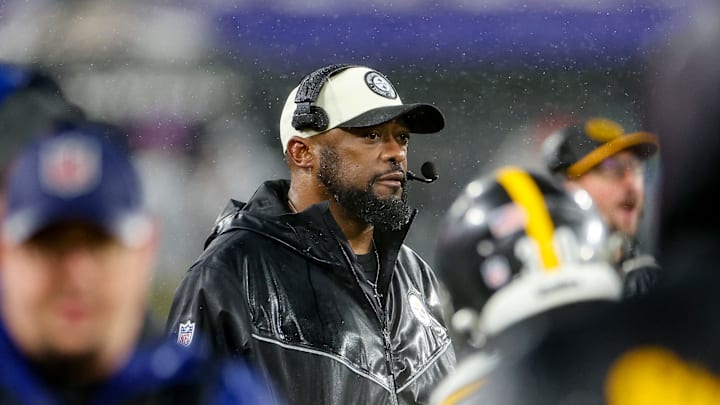The Steelers announced on June 10 that they have extended Mike Tomlin's contract by three years, ensuring he remains the head coach until 2027. Tomlin, now entering his 18th season with the team, has experienced numerous ups and downs over the years. Recently, some fans have grown frustrated with the team's performance.
As a result, the latest contract extension has sparked mixed emotions among Pittsburgh residents and Steelers supporters.
Regardless of personal opinions on the extension, there are several reasons why some believe a three-year extension might have been a misstep.
Reason 1 : No playoff wins in 7 years
The primary reason some people feel an extension this long was the wrong move is due to the Steelers' lack of postseason success. Their last playoff win was in 2017, and since then, 23 teams have won a playoff game more recently.
The "never had a losing season" argument doesn't hold much weight for a franchise built on playoff victories and Super Bowls, neither of which the Steelers have been close to achieving.
The biggest issue for many is the lack of competitiveness in their playoff games since 2017. In each postseason appearance, they have been blown out. While some might point to the roster or the quarterback, the head coach oversees the entire team.
The NFL is a results-based business, and it's the coach's job to make the most of the roster and overcome its shortcomings. Other teams have won playoff games with less talent in the past seven years so why is this only an excuse for the Steelers?
It is unprecedented for a head coach to go into an eighth season after a seven-year stretch without a playoff win. After all the offseason moves aimed at winning now, the head coach should have received the same clear message: win a playoff game to earn a long-term extension.
If Art Rooney's offseason comments about "having enough of this" regarding the playoff drought were genuine, why is the head coach not held accountable but instead rewarded by ownership, while everyone else seems to be on notice?
#NFL The only coaches to go into an 8th season after a 7-year run without a playoff win:
— Scott Kacsmar (@ScottKacsmar) June 10, 2024
Don Shula
Jim Mora
Marvin Lewis
Mike Tomlin
Only the last 2 did it since the multiple wild card team era.
Reason 2: QB situation lacks long-term solution for right now
The uncertainty surrounding the Steelers quarterback situation looms large. Following the departure of their former first-round pick, whose development was mishandled, they've brought in an aging veteran in the twilight of his career, alongside another former first-rounder whose exciting skillset never quite translated into the franchise QB status he was once projected for.
Justin Fields, once envisioned as the future as the 11th overall pick, found himself traded by the Bears for a mere 6th-round pick, reflecting a lack of trade interest. These moves carry a high upside but also low risk, yet failure to capitalize could leave the team back at square one, with aging star players and no clear QB solution.
Extending contracts amidst this uncertainty raises eyebrows. Since Ben Roethlisberger's retirement, the Steelers, under Mike Tomlin's leadership, have struggled to find a reliable successor. If this season unfolds as feared, it begs the question: How can confidence be placed in a coach and organization that have grappled with quarterback transitions?
Should history repeat itself, it becomes increasingly questionable and difficult to envision a future under a Head Coach who has struggled to evaluate QBs effectively since Roethlisberger's retirement.
Reason 3: Bad judgement on offensive coordinator hires
In a rational assessment, this season should have marked a pivotal moment for Tomlin's tenure, particularly given on the success of Arthur Smith and his offense. The Steelers have struggled to secure a quality offensive coordinator since Todd Haley's departure, resulting in a prolonged absence of a legitimate NFL offense. Tomlin's difficulty in hiring effective offensive staff, evident in the failed attempts with Randy Fichtner and Matt Canada, has remained a persistent challenge.
If Arthur Smith fails to catalyze a significant improvement in the Steelers' offensive performance, it would underscore a much deeper issue, ultimately reflecting on Tomlin once again.
In today's NFL landscape, where offenses reign supreme, the inability to construct a competitive offensive unit despite repeated opportunities reflects poorly on any head coach. For many, it's a significant factor in why head coaches are often dismissed after just one failed attempt, let alone potentially three.
While Tomlin may merit consideration with a new quarterback and revamped offensive system, repeated failures in this regard cannot be overlooked. A third consecutive underwhelming offensive coordinator hiring would strip away any remaining justifications for retaining Tomlin. A three-year extension under such circumstances would defy logic.
The NFL operates on a "what have you done for me lately" principle, making Arthur Smith's success a significant benchmark for assessing the Steelers' long-term trajectory. If this season unfolds poorly, it should prompt a reevaluation of the team's direction, with Tomlin's leadership coming under intense scrutiny.
Reconsidering Mike Tomlin's contract extension
It would have made more sense to allow Mike Tomlin to complete the remainder of his contract and assess the team's performance before committing to a long-term extension. Even a one-year extension could have been considered, given the uncertainties surrounding the upcoming season.
Offering a three-year extension during such a pivotal period, marked by numerous unknowns, raises questions. Despite the organization's emphasis on accountability this offseason, it appears that this principle doesn't apply to Mike Tomlin.
Many NFL teams wouldn't tolerate the challenges the Steelers have faced in recent years, and extending a coach who has shown minimal improvement over time seems premature. It's unrealistic to expect an instant turnaround when there haven't been consistent signs of progress over the past seven years.
Typically, extensions of this magnitude are granted when there's evidence of improvement, but it's unclear if that's the case here.
